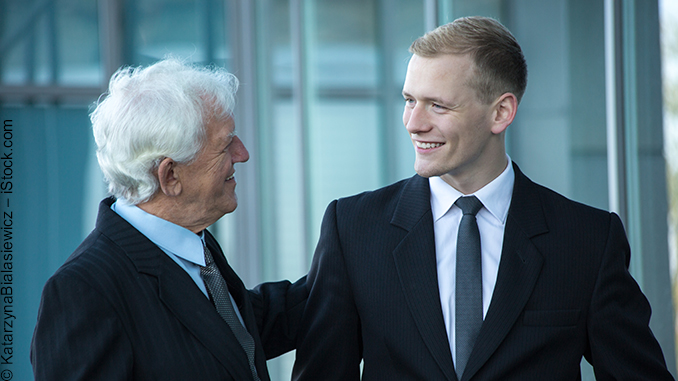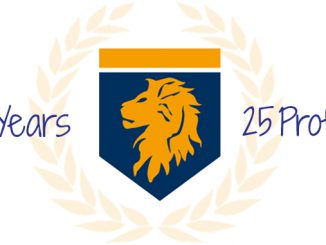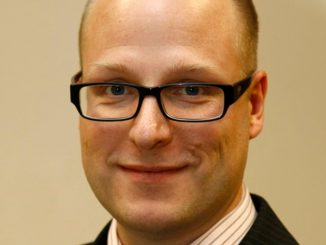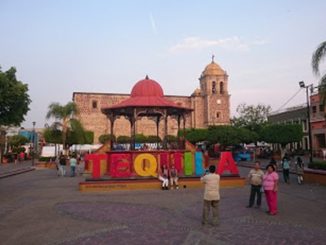
How a Deep Conversation about “Happiness” Can Nurture Constructive Discussions about Succession Planning between Senior Generations and the Generation Y
A paradox is a sentence in logic that cannot be true but also cannot be false. An easy example is: “This sentence is a lie.” If the sentence is true, then it is a lie, just as the sentence says. But if the sentence is a lie, how can it possibly be true? A lie cannot be true at the same time.
The same logic of a paradox can be applied to the upcoming challenge of the “Great Wealth Transfer”. In the coming 15 years, the biggest succession process in human history takes place. In the “Great Wealth Transfer”, business families that control financial, operational, real estate and philanthropic assets around the globe will transfer over 15 trillion USD to the Next Generation.
15.000.000.000.000 USD. Yes, that’s 12 zeros. Or in other words approximately 13 times the 2015 market capitalization of Apple, Google, Facebook and Amazon together, or 10 times the entire Canadian Gross Domestic Product.
In this process, however, business families will face a paradox: Inheritance is happiness. Receiving significant wealth through inheritance creates a responsibility and a need to administer this wealth. Often, this can even be seen as a burden. Can a burden create happiness? Can a responsibility to work on preserving and nurturing inherited wealth fuel happiness?
Welcome to SU-HA-PA: the Succession-Happiness-Paradox. Only a deep, empathic, open (and thus vulnerable) discussion about the two angles of this paradox can help understanding it better in every business family, and potentially finding a solution for it, that combines personal passions, profit and purpose.
Today, too many business families end-up in long legal battles over assets, power and influence, slow their operational companies down through unclear or disputed family leadership and governance, or leave such large (and potentially unstructured) amounts of capital to the Next Generation that wealth protection alone is already more of a life-dominating burden than a privilege. Not really what one would call “happy”.
And alongside all of the discussions about wealth preservation and potential growth, two main questions often remain unanswered:
- Who are we as a business family, and why do we do all this – how can we administer the assets inherited, and while doing so also live a happy life?
- And, which philanthropic impact could we achieve by allocating a fraction of our capital to social good and helping others? And how does this correlate with a happy life?
Having worked with some of the largest business families around the globe over the last ten years, it became evident that assets and influence of business families do not necessarily correlate with their happiness, personal energy levels, positive mental state and forward-looking passion to maintain and further nurture prosperity.
Therefore, building a bridge between happiness research and the knowledge on business families and legacy can provide a valuable contribution to a positive interpretation of the opportunities for prosperity creation, hidden in the “Great Wealth Transfer” and combine “great business with happy family”.
The Happiness Formula
Happiness = Happiness Set Point + Life Circumstances + Voluntary Activities (see Seligman, 2002)
The Happiness Set Point accounts for roughly 50% of total happiness. It is rooted in birth and genetics and the general outlook on life. The Happiness Set Point can be positively influenced by e.g. meditation as well as mindfulness and other practices. These additional small influences, however, need to be trained – otherwise they are only temporary since humans are great in adapting comparatively quickly to new situations.
Circumstances account for 10% of happiness: It is strongly based on the quality of relationships, the financial circumstances, and looks. Here, having time to genuinely nurture truly deep friendships and personal relationships can be quite a “happiness booster”. Being stuck in operational business meetings from early morning and late nights limits this option.
The remaining 40% of the “Happiness Formula” depend on Personal Choices: How and where to live and work. Here, the current senior generation might have been strongly driven by the passion (and/ or bare need) to create a good life for the family, after a war, after the opening of a formerly closed market, or in a context of dramatic political change that put past society hierarchies into “limbo”. For the senior generations, there often were no personal choices after their teen years. It was survival first, and survival became a business, the business became purpose in life. This is different with today’s Next Generations. They ask “Y” before setting out in and after their teens.
Taking these three modules of the “Happiness Formula” together, a significant difference between the “formula of the senior generations” and the “formula of the Next Generation” becomes evident.
This is the root cause of SU-HA-PA!
Whilst the senior generations often defined life’s purpose as creating a better life for their children, leveraging opportunities to create economic wealth and rising to be respected business figures in their respective communities, the Next Generation might have a different idea of the what makes them happy, the “circumstances” which they would want to accept and their “personal choices” of how to live and where. Receiving and having to manage what “mom and dad” (and potentially the grand-parents and beyond) have built, often looks like the anti-definition of happiness.
If we assume that the “Happiness Set Point” is a factor that is rather fixed, and that especially the quality of relationships can be influenced as part of the factor of “circumstances”, then happiness largely depends on the personal choices of how and where to live – for an individual and for any member of a business family.
For the past generations this, in fact, was never a question nor a choice either. If a business was inherited from a previous generation, then continuing it from wherever it was located was the clear path forward. Not opting to continue the family business was either a rebel move or the first step to lose any right to inheritance.
For the Next Generation today, in turn, how and where to live comes down to a couple of essential questions:
- the definition of work-life balance and having enough income,
- the definition of doing something that has a higher purpose,
- the extent to which existing assets are allowed to dominate personal choices (i.e. the burden of inheriting versus the opportunity to create, based on an inheritance), and a personal preference of location based on circles of friends and cultural context. Furthermore, the Next Generation often treasures experiences more than ownership of things – in the private and the business context.
While, in general, half of the Generation Y/ Millennials believe that they won’t be able to lead a better life than their parents, nearly two thirds believe that they will be able to make a difference in their local environment. According to the Telefónica Millennials Study, 40% even believe that they can make a global difference. Therefore, a focus on purposeful activities with a positive impact on the society and environment is in tune with the younger generations’ expectations. A Munich Business School study that distilled the main factors that contribute to work related happiness within the Generation Y showed, in fact, that purpose based aspects at work which reflect more eudaimonic happiness are more important to the young working generation today compared to factors that influence hedonic happiness (such as material incentives or income).
In short: while the parents tried to create wealth and life protection for their family, the Next Generation will strongly want to use their platforms to create a difference for the world at large. This can be a major discussion point between generations if not understood and discussed profoundly.
So, let’s talk about work-life balance, “hunger”, and wealth creation versus wealth preservation:
In the past, it was interpreted that more money makes people happier. In fact, however, the happiness impact of more money decreases significantly (one could call it the marginal rate of happiness per USD is decreasing) above 50.000 USD net per year.
After this threshold, what keeps individuals as well as family entrepreneurs going is the “hedonic treadmill”, chasing the bigger house, the bigger firm, or the bigger jet, but the underlying happiness level is in fact not affected. Often, “getting more” is based on a deep need for additional social recognition. Especially in hierarchic societies “being up there at the top” was a strong driver for creating more wealth and influence. And, in instable societies, being at the top of society and therefore powerful, was a risk mitigation strategy.
Now, the above has significantly changed for many members of the Next Generation. The base income is often secured by the capital base created by the parents, grandparents etc. The underlying definition of the “hedonic treadmill” has shifted from “owning things” to “accumulating experiences”. Social recognition is instant through social media and a constantly connected circle of friends on social networks. Hence, what might have been the parents’ driver to create wealth and security, might simply not exist in the same way for the Next Generation.
Very few Next Generation members might be as “hungry”, literally and also along the lines of Tony Robbins’ definition of “hunger” as in “drive, motivation and grit”, as their parents where. “Dad, we’ve got enough stuff, let’s just chill and hang”, might be a common phrase at the business family’s dinner table. The Next Generation will create for the sake of creating and the experience of being entrepreneurial, or venture into other domains, and this may be largely misaligned with the senior generations’ definition of success, which was “to create for the family’s protection and for social recognition”.
Therefore, one can expect that only very few Next Generation members will want to strive for more “wealth creation”. The 2014 Best for Planning study has shown, that only 21% of the millennials are striving to create a great career for themselves. Approximately 38% are traditionalists that prefer a classic, stable and structured life, about 18% are sense seekers, and the remaining 23% are stability seekers or prefer to accumulate experiences, starting over and over again, without ever taking the full responsibility for the initiatives created. Amongst all of these, sense seekers are the fastest growing group.
“Wealth preservation” with an additional zest of “experience-oriented lifestyles” and giving back to the wider community will therefore be the dominant logic for many business families over the next decades. This situation might be even more prominent in markets that have reached a certain level of maturity and security of basic needs (Europe, North America). A remaining “hunger” to create wealth might be more prominent in the Next Generations from markets that still strive to “catch up” (Asia, Africa, Latin America, and post war regions).
A Transparent Desolate State of the World, and the Rise of “Giving Back”
In a world of constant transparency and awareness of the omnipresent challenges, “giving back”, to a larger or smaller extent, is becoming increasingly important for the Next Generation. There are many examples in which Next Generation members create social enterprises, start or run foundations or link products from the “underdeveloped markets” with the buying power of the industrialized world, for the sake of both sides. Hence, the purpose of “providing for the family” that the senior generation might have followed is slowly shifting to “providing back to society”, given that the elders have created a very stable base of wealth already.
Now, how can business families recognize, address and potentially use the SU-HA-PA for transition of wealth, legacy and opportunities from one generation to the next?
- Recognize the paradox and accept both points of view.
- Deeply share what drove the passion, profit and purpose definition of the senior generation, and how the external context and family history influenced this.
- Explain (and listen to) the Next Generation’s definition of passion, profit and purpose.
- Develop an idea how both definitions can be combined, mutually supported and put into the context of the family’s assets.
- Jointly build a strategy that recognizes the need for succession, and the need for the Next Generation to receive and steward assets in some manner into the future.
- Jointly define what happiness means for both generations and build a support system around the family that allows to nurture wealth whilst empowering happiness of the family at the same time.
Because business families can most likely not solve the paradox alone, especially if they control significant portfolios of wealth (foundations, operational companies, direct/ alternative investments, financial investments, Next Generation ventures), understanding the paradox is also important for the industries that serve business families:
In order to nurture a swift transition of assets from one generation to the next, anybody who supports a business family as a service provider must try to understand what made the past generation “happy”, and what drives this emotion for the Next Generation. In the absence of such an understanding and a well-designed process to empower happiness for the Next Generation, any professional advice might be biased in the direction of the service provider’s expertise, but will not support solving the SU-HA-PA. Assets might be forced onto fairly young future leaders, conflicts of understanding might arise and the senior leaders of business families might take irrevocable decisions, based on their pure (potentially wrong) assumption that “the kids are not going to follow in my footsteps”. If openly discussed, and accepting the Next Generations views too, a joint definition of the family’s joint footsteps and forward looking legacy of the senior generation is possible.
Somebody will have to continue to hold the assets together – to assure wealth preservation as the base of all discussions regarding “business family happiness”. After all, work-life balance is great, but should not lead to underperforming family assets. In this context, good management teams in operational assets, holding companies or family offices that understand the senior as well as the junior generations will be paramount. Therefore, business families and their offices and holding companies will need to find “hungry” talent that will assure that all their assets, operational, financial, philanthropic, real estate etc. are well maintained, while the family itself strives for their “happy state”.
And, in summary, Rabindranath Tagore’s famous quote might be a good discussion ground for a deep and honest exchange between senior and junior generations, and all service providers to Business Families: “I slept and dreamt that life was joy. I awoke and saw that life was service. I acted and behold, service was joy.” After all: Succession/ transfer alone does not trigger a happy life, and an “empty definition of happiness” without any responsibility for a legacy, identity and belonging built by prior generations is not sustainable either.
Hence: Understanding the Succession-Happiness-Paradox of each individual family is already a step of turning a paradox into a power-core for Next Generation prosperity.









